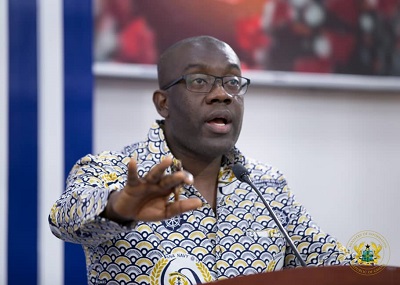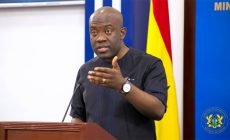Oppong Nkrumah justifies imposition of emissions levy, VAT on Electricity
- Posted on
- Comment

The Minister of Information, Kojo Oppong Nkrumah, has justified the government’s decision to impose an Emissions Levy, VAT on electricity consumption and other taxes.
In an interview on Face to Face on Citi TV with Umaru Sanda Amadu, the Ofoase-Ayirebi MP decried the government’s failure to achieve its projections to close the fiscal gaps, emphasizing the importance of the government’s imposition of new taxes.
According to him, the new taxes including VAT on electricity if implemented would have helped the government to clean its books.
“Successes in implementing some of those revenue handles eluded us, look at the e-levy, the projections that were made in e-levy didn’t come through. Once those projections didn’t come through, we had to resort to other measures like the Fund [IMF] to help plug those. When you go into a programme with the Fund, they are going to bail you out, and then they will require you to mobilise those revenues that you didn’t mobilise. To start cleaning up your books.
“This VAT on electricity is something that has been passed if my numbers are correct as far back as 2013, and 2014. But has never been implemented, and the view of the Finance Minister [Ken Ofori-Atta] was to go ahead with its implementation. It proved very unpopular, the cabinet didn’t agree with that view and the ministry has walked that back [suspend]. The purpose of that was to close the fiscal gaps,” he explained.
He highlighted the impact of the COVID-19 pandemic on the economy, stating that any attempt to wish that shock away wouldn’t be fair to the government.
“Do not take away the occasion of 2020, for example, the IMF managing director described as the biggest economic shock [COVID-19] since the last depression. You can’t wish that away, it was such a significant event. Anybody who seeks to analyse Akufo-Addo’s administration from 2017 till now and seeks to wish away, with the greatest of respect, the significant development of these global economic shocks occasioned by COVID-19. I don’t think it’s fair to the facts.”
The MP explained that the government’s revenues stopped flowing when the Golden Triangle of Ghana’s economy, was shut down, hence the bailout from the IMF.
“Look at the period 2017 and 2019, and 2021 to now, you will see numbers and evidence that speak for themselves. And if you put them all together, then you account for the impact of the 2020 economy. Look at it over a time frame, nuisance taxes were removed in 2017 and in consonance with the promise of moving from taxation to productivity, you noticed that productivity picked up in 2017, 2018 and 2019. In 2020. When we literally shut down the Golden Triangle of Ghana’s economy, growth was averaging 5 per cent plus. When we came to power, growth was about 3.6%.
“In 2020, when we shut down the Golden Triangle, the government’s revenues were not coming. You had to borrow unprecedentedly to keep the Ghanaian economy functioning and asked the central bank to finance the government. That is how you got the resources to keep the Ghanaian economy functioning,” the Minister of Information said.
The government was heavily criticized following the imposition of the new taxes, forcing the government to suspend the 15 per cent Value Added Tax (VAT) on domestic consumption of electricity.
Both the Electricity Company of Ghana (ECG) and the Northern Electricity Distribution Company (NEDCO) were directed by the Ministry of Finance to put the charging of the levy on hold.
This was contained in a press statement issued by the Ministry of Finance on Wednesday, February 7, 2024.










 (Selorm) |
(Selorm) |  (Nana Kwesi)
(Nana Kwesi)